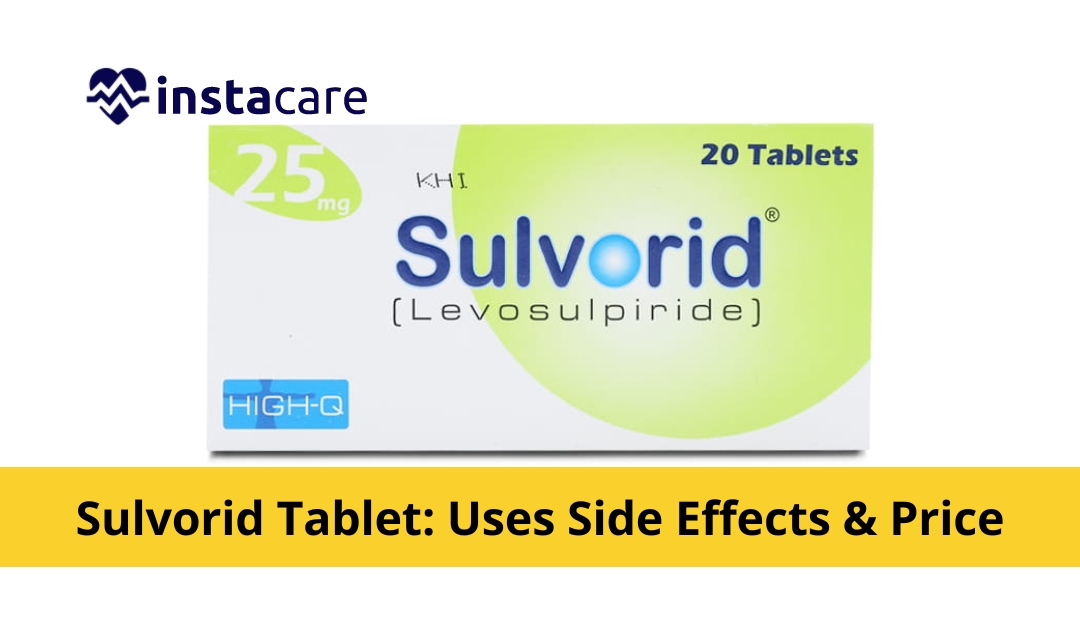Introduction
Sulvorid is a medication that contains levosulpiride as its active ingredient. Levosulpiride is a dopamine d2 receptor antagonist that is used to treat a variety of gastrointestinal disorders. It works by increasing the motility of the digestive tract, reducing the symptoms of nausea, vomiting, bloating, and abdominal pain.
Uses of sulvorid tablet
Sulvorid, which contains levosulpiride, is used to treat
various gastrointestinal disorders, including:
- Functional dyspepsia: sulvorid is commonly used to treat
functional dyspepsia, which is a condition characterized by upper abdominal
pain, bloating, nausea, and indigestion.
- Gastroesophageal reflux disease (gerd): sulvorid is also
used to treat gerd, a condition that causes acid reflux and heartburn.
- Irritable bowel syndrome (ibs): sulvorid may be prescribed
to treat ibs, which is a common condition that affects the large intestine and
causes symptoms like abdominal pain, bloating, constipation, and diarrhea.
- Gastroparesis: sulvorid is sometimes used to treat
gastroparesis, a condition in which the stomach takes too long to empty its
contents, leading to symptoms like nausea, vomiting, and bloating.
- Other gastrointestinal disorders: sulvorid may also be prescribed
to treat other gastrointestinal disorders, such as peptic ulcers and non-ulcer
dyspepsia.
Drug interactions
Some common drug interactions of sulvorid include:
- Central nervous system (cns) depressants: levosulpiride can
enhance the effects of cns depressants such as alcohol, sedatives, and
tranquilizers, leading to excessive drowsiness, dizziness, and impaired
coordination.
- Antacids: antacids can reduce the absorption of
levosulpiride, reducing its effectiveness.
- Levodopa: levosulpiride can reduce the effectiveness of
levodopa, a medication used to treat parkinson's disease.
- Ketoconazole: ketoconazole can increase the levels of
levosulpiride in the blood, leading to increased side effects.
- Digoxin: levosulpiride can reduce the absorption of digoxin,
a medication used to treat heart failure.
- Metoclopramide: levosulpiride and metoclopramide both work
by increasing gastrointestinal motility, and using them together can lead to
excessive stimulation of the digestive tract.
Disease interactions
Some common disease interactions of sulvorid include:
- Parkinson's disease: levosulpiride can reduce the
effectiveness of levodopa, a medication used to treat parkinson's disease.
Therefore, it should be used with caution in individuals with parkinson's
disease.
- Epilepsy: levosulpiride can lower the seizure threshold and
increase the risk of seizures in individuals with epilepsy.
- Liver disease: levosulpiride is metabolized in the liver,
and individuals with liver disease may have reduced liver function, which can
affect the metabolism of levosulpiride. Therefore, it should be used with
caution in individuals with liver disease.
- Renal impairment: levosulpiride is excreted by the kidneys,
and individuals with renal impairment may have reduced kidney function, which
can affect the elimination of levosulpiride from the body. Therefore, it should
be used with caution in individuals with renal impairment.
- Gastrointestinal obstruction: levosulpiride can increase
gastrointestinal motility, and in individuals with gastrointestinal
obstruction, it can worsen the obstruction.
Food interactions
There are no known food interactions with sulvorid which contains levosulpiride.
View More: Citanew Tablet - Uses Side Effects And Price In Pakistan
Side effects of
The usual side effects of sulvorid include:
- Drowsiness
- Dizziness
- Headache
- Nausea and vomiting
- Diarrhea
- Constipation
- Dry mouth
- Increased salivation
- Breast enlargement in men
- Irregular menstrual periods
The complicated side effects of sulvorid are rare but can
occur. They include:
- Extrapyramidal symptoms (eps): these are movement disorders
that can include muscle stiffness, tremors, restlessness, and involuntary
muscle movements.
- Tardive dyskinesia: this is a rare but potentially
irreversible movement disorder that can develop after long-term use of
sulvorid.
- Neuroleptic malignant syndrome (nms): this is a infrequent
but likely life-threatening situation that can happen with the utilization of
sulvorid. Symptoms can include high fever, muscle rigidity, altered mental
status, and autonomic dysfunction.
- Allergic reactions: rarely, sulvorid can cause allergic
reactions that can include skin rashes, itching, hives, swelling of the face,
tongue or throat, and difficulty breathing.
Dosage form
Levosulpiride is available in various dosage forms such as tablets, capsules, and injections. The most commonly prescribed form is the tablet, which can be taken orally with water. Levosulpiride tablets are available in different strengths, typically ranging from 25 mg to 75 mg.
View More: Digestine Tablet - Uses Side Effects And Price in Pakistan
Dosing information
The recommended dosages for common conditions are as
follows:
- Gastroesophageal reflux disease (gerd): the usual adult
dosage is 25 mg to 50 mg three times a day, taken before meals.
- Dyspepsia: the usual adult dosage is 25 mg to 50 mg three
times a day, taken before meals.
- Irritable bowel syndrome (ibs): the usual adult dosage is 25
mg to 50 mg three times a day, taken before meals.
- Psychiatric disorders: the dosage and duration of treatment
vary depending on the condition being treated and the patient's response to
therapy. It is recommended to start with a low dose and gradually increase the
dosage as necessary.
Packaging
- For tablets, it is typically packaged in blister packs or
plastic bottles. The blister packs are individual pockets of a thin,
transparent plastic film that protects the tablets from moisture and light. The
plastic bottles usually contain a desiccant to absorb moisture and prevent
degradation of the medication.
- For injections, sulvorid is typically packaged in glass
ampules or vials containing sterile solution for injection.
Storage
The following are general guidelines for storage:
- Tablets and capsules: store in a cool, dry place away from
light and moisture. Avoid storing in a bathroom or kitchen where humidity and
temperature fluctuations can occur. Keep away the medicine from the reach of
the children
- Injections: store in a refrigerator at a temperature between
2°c to 8°c (36°f to 46°f). Do not freeze the medication. Keep away the medicine
from childrens.
Price of
- Sulvorid (levosulpiride) 25mg box of 20 tablets is of
226pkr.
- Sulvorid (levosulpiride) 50mg box of 20 tablets is of 374pkr.

